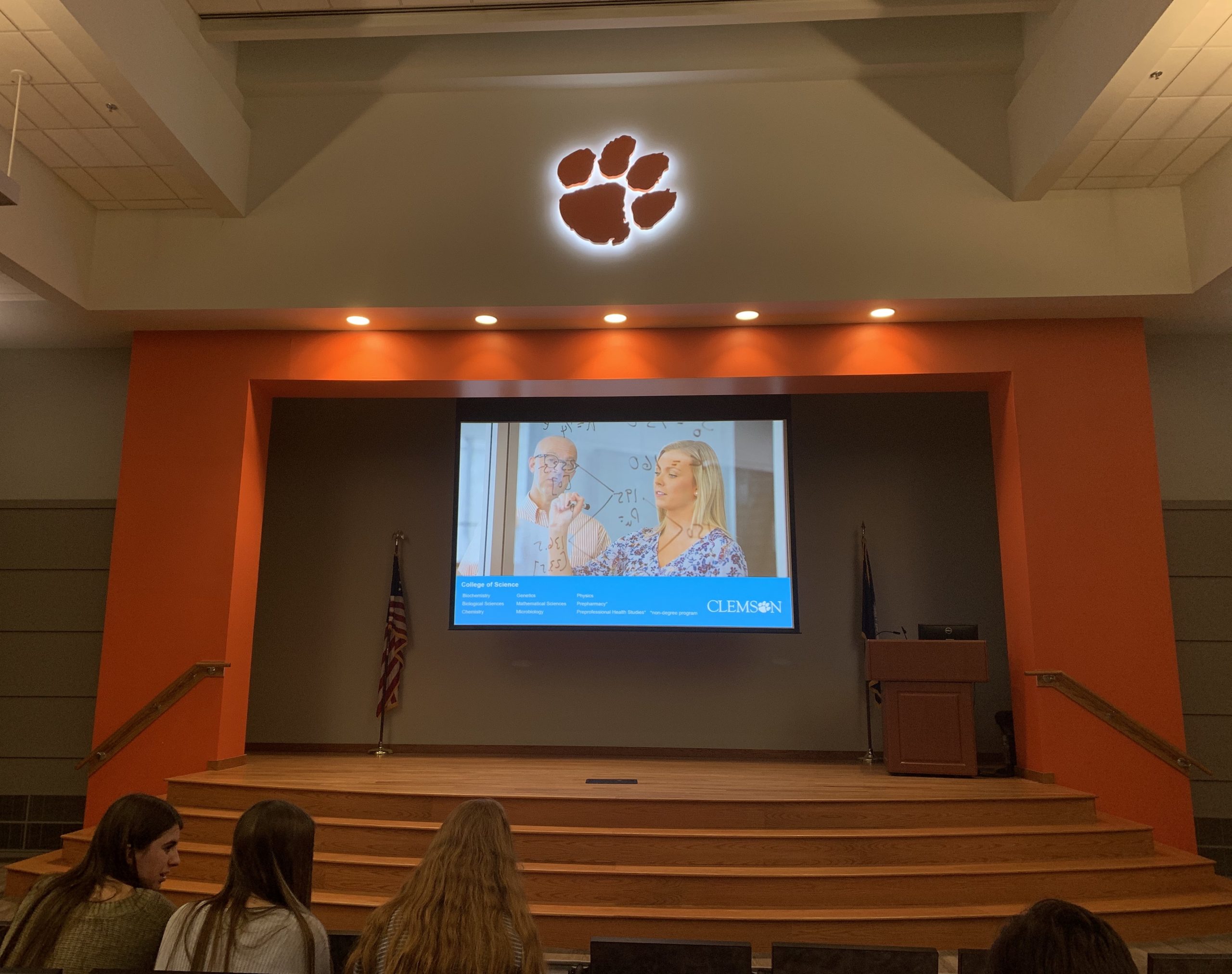Laid out in a target shape, Clemson University has all of its on-campus buildings preceding each other in rings. Somewhere in the middle, the tour begins at the visitor center. (Photo courtesy of Lyric Chassin)
As a rising senior, the college journey is slowly starting to infuse itself into my life. Now is the time that most juniors start looking into their future. Whether it’s college, work, or a gap year, students tend to have a general idea of what their future path is. Most of the time, it’s college. In today’s workfield, it’s almost impossible to get a well paying job without a college degree.
With my decision to go to college, I have begun to tour my colleges of interest. So far, I toured North Carolina State University, the University of North Carolina at Chapel Hill, and Clemson University.
Tours tend to be about an hour and a half long wherever you go. Groups meet in the college’s visitor center and view a presentation by an admissions advisor. Often, this presentation highlights a student experience at the college and the application process.
Touring gives aspiring students the opportunity to get an insight into the class and social lifestyle of the college. Impressions are made based off of this and frequently influences college decisions. Students can have their sights set on a certain school but after a tour may decide they don’t want to apply anymore.
Julia Renburg, a senior at Leesville, has her sights set on Appalachian State after her tour there. “It was the main reason I applied, and a big part of why it’s one of my top choices right now,” she said.
Jordan Harrell, a junior at Leesville, is planning on applying to Meredith after her college tours. “I loved the atmosphere, and it’s really pretty with really pretty buildings,” she said.
College tours make an everlasting print in students minds. What they choose to show and how they choose to show it can greatly affect how the school is perceived.
Renburg thinks it’s important for a college tour to show the everyday spaces rather than classrooms. “Being able to see a lot of the places you’ll be actually living in everyday, like dorms and dining halls and study spaces. A prestigious program is great and all but being able to actually picture yourself living somewhere is also super important since you’ll be there for four years,” she said.
Harrell focuses more on the tour guide aspect of it all. “The tour guides letting you know a lot of important info and fun little tips from a student, the overall campus and student atmosphere and life on the campus [are important],” she said.
Renburg toured over 12 colleges, including Georgetown University, Richmond University, William & Mary, and College of Charleston. After touring all these schools, Renburg is close to making her final college decision. “I haven’t decided yet but will very likely go to UNC Chapel hill or Appalachian State, or potentially the University of South Carolina.”
Harrell is a junior; she won’t start the application process until the fall of her senior year. So far, Harrell has toured Elon, UNC Greensboro, Appalachian State, Meredith College, and East
Carolina University. “My number one choice to apply to is Meredith and I want to major in dance education or double major in dance education and social work,” she said.
In my personal college touring experience, the tour hasn’t really affected my opinions. My favorite college from a young age has been Clemson University; the meek tour barely altered my view. The campus is massive, and the students giving the tour did a terrible job in covering everything. I left the school feeling at home on the campus but somewhat unaware of all of the aspects the school has to offer.
My favorite tour was UNC Chapel Hill. Also being one of my current top schools, the tour sold me on it even more. My guide went into great detail of every building we passed, showed us the different opportunities the school has to offer, and answered all of the many questions we had.
After touring NC State University, I’m unsure where the university stands on my list of colleges I plan on applying to. The group was not split up into smaller groups like it was on the other tours. An extremely large group of high school undergraduates were led by three college students who didn’t seem to know what they were talking about. They avoided explaining the contents of the majority of the buildings and failed to show us everyday spaces like dorms, dining halls, librairies, and other study spaces.
Overall, college touring seems to be a helpful experience for many. Getting that real life experience and attempting to visualize yourself at a school can be extremely helpful when making the big decision.

Hi! My name is Lyric and I am a senior editor and the website editor for The Mycenaean. I am also Vice President of Quill and Scroll Society, Makeup Crew Head, and a member of National English Honor Society.

Leave a Reply